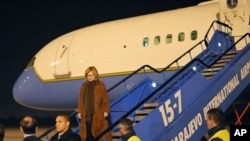U.S. Secretary of State Hillary Clinton is in the Bosnian capital, Sarajevo, at the start of a Balkans trip that will also take her to Serbia and Kosovo. She is expected to press Bosnian leaders, in the wake of this month's elections, to move ahead on reforms.
Many analysts see the election outcome as perpetuating the political stalemate in Bosnia-Herzegovina.
But senior U.S. officials say there was significant support for candidates who reached out across ethnic lines, and they say Clinton will press leaders here to seize the opportunity of the election to move on reforms.
Bosnia emerged from more than three years of civil war in 1995 with a peace agreement that provides for a complex power-sharing arrangement between a Muslim and Croat federation and an autonomous ethnic-Serb republic.
The post-war arrangement is cumbersome and allows either side to veto reforms for a stronger central government and better functioning state.
Clinton, in the first Bosnia visit by a U.S. Secretary of State since 2004, will meet the country's three-member presidency and other key political figures to press for constitutional and other changes deemed necessary for European Union and NATO membership.
Assistant Secretary of State for European Affairs Philip Gordon, who talked to reporters en route to Sarajevo, said Clinton's visit - just days after the election - comes at a key moment.
"Now is an opportunity," said Gordon. "And I think the European Union has been clear with Bosnia; we [the United States] have been clear with Bosnia; NATO has been clear with Bosnia [on] the types of reforms they need to undertake. And the secretary is going to Sarajevo, in part, to reinforce that message and make clear that if Bosnia wants to move forward in this direction, that' what they're going to have to do."
Clinton will move on from Sarajevo to Belgrade on Tuesday to meet Serbian President Boris Tadic and other key officials to press for Serb cooperation on Bosnian reforms and on Kosovo - the mainly ethnic-Albanian region that declared independence from Serbia in 2008 and is still not recognized by Belgrade.
Assistant Secretary Gordon urged Serbia to heed a U.N. Security Council resolution last month appealing for peaceful dialog between Belgrade and Kosovo.
He said Serbia should deal with Kosovo, whose independence is recognized by the United States and most of the European Union, as an equal and put aside any notion of trying to reincorporate majority ethnic-Serb parts of Kosovo.
"We believe that that discussion over," he said. "We're absolutely clear that Kosovo is a sovereign, independent state, and we know where the border is. So that is not going to be part of the talks. But if Serbia is going to continue down the path to joining Europe and become the stable, prosperous, democratic state that we want, and we believe that Serbs want, then they're going to need to find a way forward on the issue of Kosovo."
On Wednesday, Clinton will make the first visit to Kosovo by a U.S. Secretary of State since its independence two years ago.
In addition to meeting with the new country's political leadership in Pristina, she will visits the mainly ethnic-Serb town of Gracanica to meet local political and Serbian Orthodox church leaders, and underscore U.S. support for minority rights.
Clinton Presses Bosnia on Post-Election Reforms




